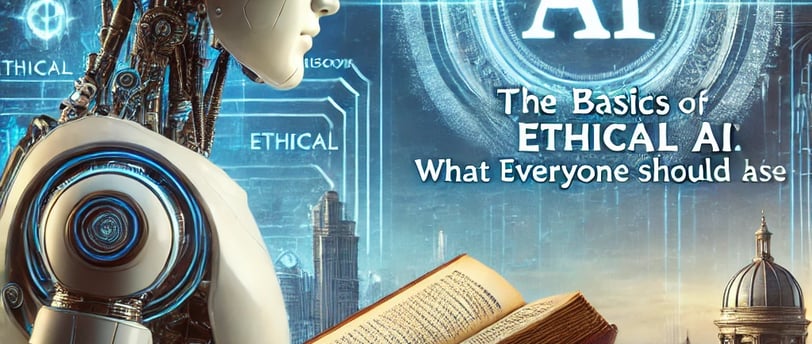The Basics of Ethical AI: What Everyone Should Know
This blog post aims to provide a clear and comprehensive introduction to ethical AI, suitable for both new learners and informed readers, ensuring they grasp the essential concepts and understand their importance in the evolving landscape of AI technology.
3/11/20252 min read


The Basics of Ethical AI: What Everyone Should Know
As artificial intelligence (AI) continues to evolve and integrate into various sectors of our lives—from healthcare and education to finance and transportation—the ethical implications of its development cannot be overstated. Ethical AI refers to the principles that guide the development and use of artificial intelligence technologies in a manner that respects human rights and values. But what exactly does it mean, and why is it crucial for everyone to understand? This post delves into the foundational aspects of ethical AI, outlining its importance and the core principles that should guide its use.
Understanding Ethical AI
At its core, Ethical AI involves creating and using AI technologies in a way that is transparent, accountable, and devoid of bias, ensuring fairness and respect for all individuals affected by its operations. The objective is not just to prevent harm but to actively promote a positive impact through responsible design and implementation.
Key Principles of Ethical AI
Transparency: AI systems should be transparent in their operations. This means that the processes by which AI makes decisions should be understandable by the users and open to inspection by relevant authorities. Transparency builds trust and facilitates easier identification and correction of potential flaws in the system.
Accountability: There must be mechanisms in place to hold developers and deployers of AI systems accountable for how their technology affects individuals and society. Accountability ensures that ethical considerations are prioritized during the development phases and that there are consequences for ethical breaches.
Fairness: AI should be free from biases that can lead to discrimination against certain groups. Ensuring fairness involves critical examination of the data used for training AI systems, the design of the algorithms, and the continual assessment of outcomes to guard against biased results.
Privacy Protection: Protecting personal data processed by AI systems is a paramount concern. AI developers must adhere to data protection laws and principles, ensuring that personal information is handled securely and with respect for user privacy.
Beneficence: Beyond avoiding harm, ethical AI seeks to benefit individuals and society. This involves designing AI systems that enhance societal well-being and contribute positively to human advancement.
Why Ethical AI Matters
The implications of unethical AI are profound and wide-reaching. Bias in AI, for instance, can lead to unfair job screening processes, biased law enforcement surveillance, and unequal healthcare outcomes. By adhering to ethical principles, developers and users of AI can prevent harm and injustice that might arise from these technologies.
Moreover, as AI technology becomes more sophisticated, the potential for deeper integration into daily life increases, making it imperative that these systems are developed with a strong ethical foundation to ensure they serve the public good without infringing on rights or freedoms.
Challenges to Implementing Ethical AI
While the principles of ethical AI are clear, their implementation can be complex. Issues such as identifying and removing bias in data, ensuring transparency in complex algorithms, and balancing innovation with ethical considerations pose significant challenges. Moreover, there is often a tension between commercial incentives and ethical imperatives, which can complicate the prioritization of ethical guidelines.
Moving Forward with Ethical AI
To advance ethical AI, a collaborative approach is needed. This includes involvement from policymakers, technologists, civil society, and the public. Education and awareness about AI ethics are crucial, as they empower everyone to demand higher standards and participate in discussions about the future of AI.
In conclusion, ethical AI is not just a regulatory requirement but a foundational aspect of how AI should be integrated into society. Understanding and implementing the principles of ethical AI is essential for ensuring that technology serves humanity with fairness, accountability, and respect for all.
Ethics
Explore ethical AI insights for professionals and citizens.
Future
Resources
nt@vsvsv.tech
+91 70757 37467
© 2024. All rights reserved.
